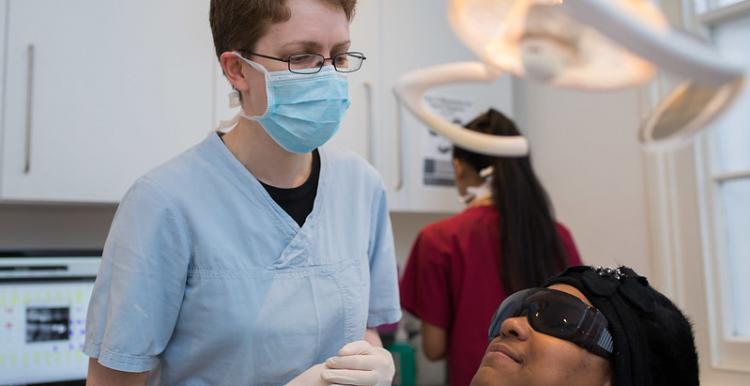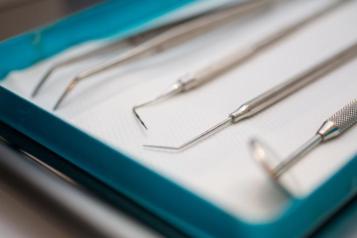Dentistry and the impact of COVID-19

Since the outbreak of COVID-19, we have seen a significant increase in the number of people telling us about the problems they face when trying to get an NHS dentist appointment, suggesting the impact the pandemic has had on dentistry has been particularly acute. We take a look at the key issues people have raised with us.
What did people tell us?
Between July and September 2020, we heard from 1,313 people about their experiences of dentistry, compared to just 238 people in the previous three months. Their stories show that often they were unable to get the care they needed, leaving them in pain and at risk of serious long-term oral health issues:
- Access to dental care - the pandemic has made it difficult for most people to access both routine and emergency dental services, with many feeling unsure about when they would next see a dentist or leaving others to travel long distances to get care.
- No routine care - although dental practices have now reopened, people are still unable to get an appointment for check-ups, hygienist appointments or fillings.
- Limited NHS appointments - people have reported struggling to access NHS dentistry because practices are either not taking on new NHS patients or have no available NHS appointments.
- Treatment still on hold - in some cases, dentists have not been able to continue treatment started before lockdown, meaning people have been left in pain and with unresolved issues, like a broken tooth.
- Access to emergency treatment - people have told us they can’t get through to their dentist when they need urgent care or are unable to access treatment if they do not meet the criteria for it.
- Affordability - our evidence suggests practices are prioritising private patients over NHS ones or are only offering non-urgent treatment if they pay privately.
- Lack of information - inaccurate information from the NHS 111, NHS Choices and dental practice websites can leave people frustrated and confused.
- Confusion about registration - a dental practice cannot de-register someone, but often people who have had a long gap since their last appointment are told they have been, when really what the dental practice means is that there are no available NHS appointments.
- COVID-19 measures - while practices did adapt once they reopened, not all of them understood how COVID-19 measures would impact some groups of people or didn’t follow all the measures needed to make people feel safe.
4% of people also told us about positive experiences of dental care, praising staff who were helpful, kind and considerate and highlighting that clear and regular information from dental practices made them feel reassured.
Read the report
Between July and September 2020, over 38,082 people shared their experiences of using health and social care with Healthwatch. Our briefing is a summary of the key issues that the public are telling us about, including:
- Access to NHS dental care
- The support provided in care homes
- Getting COVID-19 tests
The consequences of not getting treatment
People who struggled to access dental treatment during the COVID-19 pandemic, told us they experienced inconvenience, anxiety, worsening problems requiring further treatment, or worse. Victoria and Samantha share the impact poor dental care has had on them and their loved ones.
'Living my worst nightmare'
After needing emergency dental care, Victoria has struggled to get follow up treatment and has been unable to register her son at a dentist, unless she pays privately.
She tells us about the impact this has had on her.
“None of the dentists I have seen seem at all interested in trying to find out why my teeth are crumbling, despite having to have a total of four removed over such a short space of time. In desperation, I have spoken to my GP about the situation who instantly is concerned that during pregnancy, I have developed a deficiency of some sort. He is running blood tests to try and get to the bottom of the problem. I feel like my GP has helped me more and been kinder and more considerate than any of the dentists I have seen in the last few months. I feel that if the dentists had done this sooner, then I may not have needed so much treatment.
"I am extremely concerned that I cannot access any care for my son. The NHS website stresses the importance of preventative care when it comes to children’s teeth – and getting used to the dentist at a young age is a big part of this. Yet, my son is being denied care because I cannot afford to go private.
"The stress and worry about my son together with the pain, anguish and difficulties in securing my own treatment have left a big impact on my life. Due to having so many teeth removed, I don’t like my mouth now. I have no confidence in the way I look and am dreading people wanting photos at Christmas to celebrate my son’s first Christmas.
"Before COVID-19 I was frightened about the dentist; now the thought of trying to book appointments fills me with anxiety, the lack of care means I am needing more and more treatment causing extra stress, and my son being denied care means I am living my worst nightmare.”
Several dentists offered me the treatment as a private patient stating that they would need either a deposit or payment upfront, but no one would help my husband as an NHS patient.
'No one would help us'
When Samantha’s husband developed a problem with his tooth earlier this year, they found it impossible to access dental care in Northamptonshire.
“I called up every local dentist in the area trying to book him an appointment to be seen as an NHS patient but was unable to find help anywhere. Those that did answer said they were not seeing NHS patients, or that they were prioritising private patients. Several dentists offered me the treatment as a private patient stating that they would need either a deposit or payment upfront, but no one would help my husband as an NHS patient.
"His pain got worse, his face became swollen, he had a raging temperature, continually sweating, getting no sleep at night and a large pocket of pus developed in his mouth. His bone started to ache, and he would get rocketing pain. I continued to try and get him access to dental care for fear the infection would spread around his body, but even when I described his symptoms to the surgeries – no one would help us."
Eventually, after six weeks of agony, she managed to get her husband a short 10-minute emergency appointment. In his emergency appointment, Samantha’s husband was told that he had a bad infection and would need a root canal to resolve the issue.
“He was told to go away and register with a dentist to get a root canal done but given a prescription for a short course of antibiotics to clear up the worst of the infection in the meantime. He still has to be very careful around the tooth and still has no idea when he will receive treatment.”
What needs to change?
Looking at the issues people raised with us highlights four essential areas for improvement:
- Clearer information - NHS England and dentists need to provide more accurate and up-to-date information for patients.
- Patient registration - NHS England and dentists need to be clear that people don't register with a dentist in the same way as with a GP surgery. There is no guarantee of treatment at the same practice as a result.
- Access to care - The Government must make more resources available to dentists to help reduce the backlog caused by the pandemic.
- Affordability - The Government and the NHS should review the cost of NHS treatment, as many people struggle to pay the NHS charge, particularly as many people have less money as a result of the pandemic.

